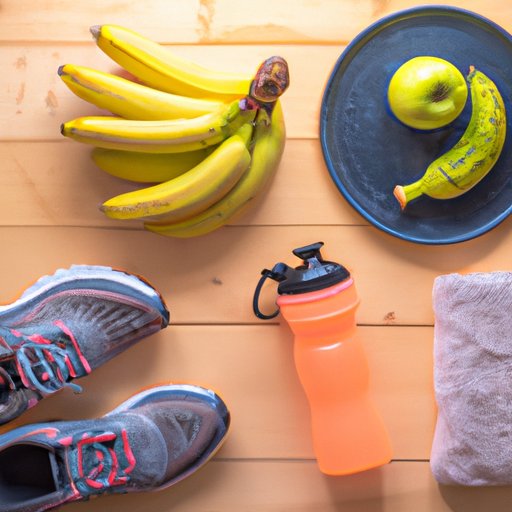Introduction
After a hard workout, it’s common to experience fatigue, muscle soreness, and even a sense of accomplishment. But for some, there’s one more symptom that can ruin the post-workout buzz: bloating.
Post-workout bloating is a condition where the body appears swollen or distended after exercise. It can be uncomfortable, frustrating, and even embarrassing. But what causes this phenomenon and how can you prevent it from happening? In this article, we’ll explore the role of nutrition and exercise in post-workout bloating, as well as practical strategies for avoiding it.
The Role of Nutrition in Post-Workout Bloating
When it comes to post-workout bloating, diet plays an important role. Certain foods and drinks can trigger bloating, while others may help to reduce it. Here are some of the ways that diet can impact bloating:
How Diet Can Impact Bloating
Certain foods can cause bloating by increasing gas production in the gut. Common culprits include beans, cabbage, Brussels sprouts, onions, and dairy products. Carbonated beverages, such as soda and sparkling water, can also contribute to bloating. Additionally, high-fiber foods, while often beneficial for overall health, can also stimulate gas production in the intestines and lead to bloating.
Nutritional Solutions to Bloating
If you’re prone to bloating after a workout, there are certain foods that may help reduce it. Eating probiotic-rich foods, such as yogurt and kefir, can help balance the bacteria in the gut and reduce bloating. Additionally, consuming foods with natural digestive enzymes, such as pineapple, papaya, and kiwi, can help break down food more quickly and reduce gas buildup. Finally, drinking peppermint tea or taking peppermint oil capsules before and after a workout may help reduce bloating.
How to Avoid Post-Workout Bloating
In addition to making dietary changes, there are certain pre- and post-workout guidelines you can follow to minimize bloating. Here are some tips for avoiding post-workout bloating:
Pre- and Post-Workout Guidelines
Before a workout, try not to eat too much or too close to the start of your workout. Eating a meal two to three hours prior to exercising can help you avoid bloating. Additionally, avoid eating high-fiber foods right before a workout, as they can cause gas buildup. After a workout, focus on hydrating properly with plenty of water. Additionally, avoid drinking carbonated beverages, as these can worsen bloating.
Eating Habits to Minimize Bloating
In general, it’s important to pay attention to your eating habits if you want to minimize bloating. Eating slowly and chewing thoroughly can help reduce gas production. Additionally, avoiding large meals late at night can help reduce bloating. Finally, drinking ginger tea or adding fresh ginger to your meals may help reduce post-workout bloating.
The Connection Between Exercise and Bloating
In addition to nutrition, certain types of exercise can also contribute to post-workout bloating. Here are some tips for minimizing post-workout bloating:
Types of Exercise That Can Cause Bloating
High-intensity interval training (HIIT) and other intense cardio workouts can increase the amount of air swallowed during exercise, which can lead to bloating. Additionally, anaerobic exercises, such as weightlifting, can increase abdominal pressure, leading to bloating. Finally, breathing incorrectly during exercise can also lead to bloating.
Tips for Minimizing Post-Workout Bloating
To minimize bloating during exercise, focus on proper form and technique. Make sure to take deep breaths using your diaphragm instead of shallow breaths using your chest. Additionally, try to limit the amount of air you swallow during exercise. Finally, take breaks between sets to allow your body to relax and reduce abdominal pressure.
Understanding Post-Workout Bloating: Causes and Solutions
Post-workout bloating can be caused by a variety of factors, including nutrition and exercise. Fortunately, there are several practical strategies you can employ to reduce bloating. Here are some of the most common causes of post-workout bloating and solutions for minimizing it:
Common Causes of Post-Workout Bloating
Some of the most common causes of post-workout bloating include eating too much or too close to the start of a workout, eating high-fiber foods, drinking carbonated beverages, and breathing incorrectly during exercise. Additionally, certain types of exercise, such as HIIT and weightlifting, can increase abdominal pressure and lead to bloating.
Practical Solutions to Combat Post-Workout Bloating
To reduce post-workout bloating, focus on making dietary changes, such as eating probiotic-rich foods, consuming foods with natural digestive enzymes, and avoiding large meals late at night. Additionally, make sure to drink plenty of water before and after a workout and avoid carbonated beverages. Finally, pay attention to your form during exercise and take breaks between sets to reduce abdominal pressure.
Conclusion
Post-workout bloating can be uncomfortable and embarrassing, but it doesn’t have to be a part of your fitness routine. By understanding the causes and solutions for post-workout bloating, you can take steps to reduce its occurrence and get back to feeling your best. With the right nutrition and exercise plan, you can enjoy the benefits of a good workout without having to worry about bloating.
So if you’re struggling with post-workout bloating, don’t give up! Implementing the strategies outlined in this article can help you reduce bloating and get back to feeling your best.
(Note: Is this article not meeting your expectations? Do you have knowledge or insights to share? Unlock new opportunities and expand your reach by joining our authors team. Click Registration to join us and share your expertise with our readers.)
